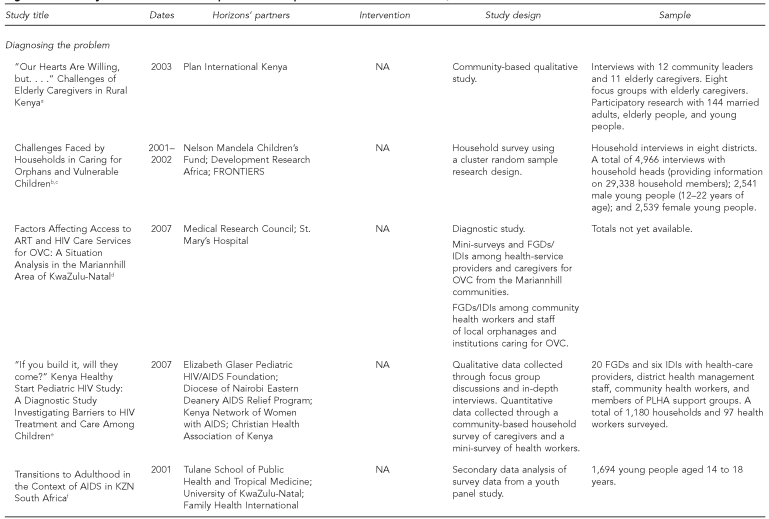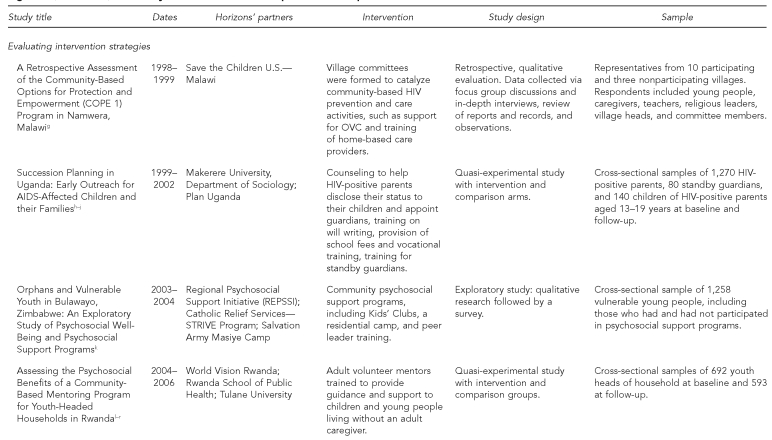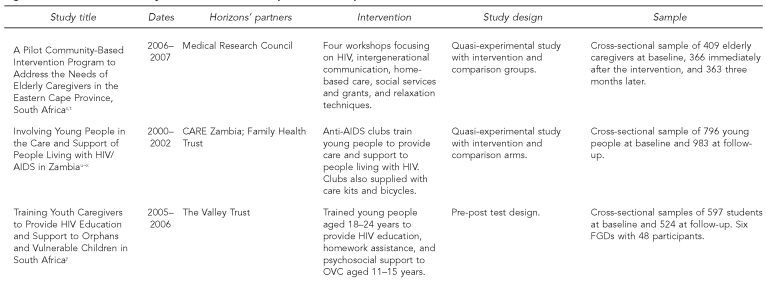Figure 1.
Summary of Horizons' research portfolio on orphans and vulnerable children, 1997–2007
aJuma M, Okeyo T, Kidenda G. “Our hearts are willing, but. . . .” Challenges of elderly caregivers in rural Kenya. Horizons Research Update. Nairobi: Population Council; 2004.
bVermaak K, Mavimbela N, Chege J, Esu-Willams E. Vulnerability and intervention opportunities: research findings on youth and HIV/AIDS in South Africa. Horizons Research Update. Washington: Population Council; 2004.
cVermaak K, Mavimbela N, Chege J, Esu-Willams E. Challenges faced by households in caring for orphans and vulnerable children. Horizons Research Update. Washington: Population Council; 2004.
dReddy P, James S. Factors affecting access to ART and HIV care services for OVC: a situation analysis in the Mariannhill area of KZN, South Africa. Washington: Population Council; 2008. (AUTHOR TO VERIFY)
eKiragu K, Schenk K, Murugi J, Sarna A. “If you build it, will they come?” Kenya healthy start pediatric HIV study: a diagnostic study investigating barriers to HIV treatment and care among children. Horizons Final Report. Washington: Population Council; 2008.
fThurman TR, Brown L, Richter L, Maharaj P, Magnani R. Sexual risk behavior among South African adolescents: is orphan status a factor? AIDS Behav 2006;10:627-35.
gEsu-Williams E, Duncan J, Phiri S, Chilongozi D. A retrospective assessment of the COPE 1 Program in Namwera, Malawi. Horizons Final Report. Washington: Population Council; 2000.
hHorizons, Makerere University Department of Sociology, Plan/Uganda. Succession planning in Uganda: early outreach for AIDS-affected children and their families. Washington: Population Council; 2004.
iGilborn LZ, Nyonyintono R, Kabumbuli R, Jagwe-Wadda G. Making a difference for children affected by AIDS: baseline findings from operations research in Uganda. Washington: Population Council; 2001.
jHorizons. Succession planning in Uganda: early outreach for AIDS-affected children and their families. Horizons Research Summary. Washington: Population Council; 2003.
kGilborn L, Apicella L, Brakarsh J, Dube L, Jemison K, Kluckow M, et al. Orphans and vulnerable youth in Bulawayo, Zimbabwe: an exploratory study of psychosocial well-being and psychosocial support programs. Horizons Final Report. Washington: Population Council; 2006.
lBrown L, Thurman TR, Snider L. Strengthening the psychosocial well-being of youth-headed households in Rwanda: baseline findings from an intervention trial. Horizons Research Update. Washington: Population Council; 2005.
mBrown L, Thurman TR, Kalisa E, Rice J, de Dieu Bizimana J, Boris N, et al. Supporting volunteer mentors: insights from a mentorship program for youth-headed households in Rwanda. Horizons Research Summary. Washington: Population Council; 2007.
nBrown L, Rice J, Boris N, Thurman TR, Snider L, Ntaganira J, et al. Psychosocial benefits of a mentoring program for youth-headed households in Rwanda. Horizons Research Summary. Washington: Population Council; 2007.
oThurman TR, Snider L, Boris N, Kalisa E, Nkunda Mugarira E, Ntaganira J, et al. Psychosocial support and marginalization of youth-headed households in Rwanda. AIDS Care 2006;18:220-9.
pBoris NW, Thurman TR, Snider L, Spencer E, Brown L. Infants and young children living in youth-headed households in Rwanda: implications of emerging data. Infant Mental Health J 2006;27:584-602.
qBoris NW, Brown LA, Thurman TR, Rice JC, Snider LM, Ntaganira J, et al. Depressive symptoms in youth heads of household in Rwanda: correlates and implications for intervention. Arch Pediatr Adolesc Med 2008;162:836-43.
rThurman TR, Snider LA, Boris NW, Kalisa E, Nyirazinyoye L, Brown L. Barriers to the community support of orphans and vulnerable youth in Rwanda. Soc Sci Med 2008;66:1557-67.
sReddy P, James SJ, Esu-Williams E, Fisher A. “Inkala ixinge etyeni: trapped in a difficult situation:” the burden of care on the elderly in the Eastern Cape, South Africa. Horizons Research Update. Johannesburg: Population Council; 2005.
tReddy P, James S, Mutumba Bilay-Boon H, Williams E, Khan H. A pilot community-based intervention program to address the needs of elderly caregivers in the Eastern Cape Province of South Africa. Horizons Research Summary. Washington: Population Council; 2009.
uEsu-Williams E, Schenk KD, Geibel S, Motsepe J, Zulu A, Bweupe P, et al. “We are no longer called club members but caregivers”: involving youth in HIV and AIDS caregiving in rural Zambia. AIDS Care 2006;18:888-94.
vEsu-Williams E, Schenk K, Motsepe J, Geibel S, Zulu A. Involving young people in the care and support of people living with HIV and AIDS in Zambia. Horizons Final Report. Washington: Population Council; 2004.
wEsu-Williams E, Searle C, Zulu A. Involving young people in the care and support of people living with HIV in Zambia: an evaluation of program sustainability. Horizons Research Summary. Washington: Population Council; 2008.
xEsu-Williams E, Geibel S, Motsepe J, Schenk K, Zulu M, Bweupe P. Involving youth in the care and support of people affected by HIV and AIDS. Horizons Research Summary. Washington: Population Council; 2003.
yNelson TC, Esu-Williams E, Mchunu L, Nyamakazi P, Mnguni S, Schenk K, et al. Training youth caregivers to provide HIV education and support to orphans and vulnerable children in South Africa. Horizons Research Summary. Washington: Population Council; 2008.
NA = not applicable
ART = antiretroviral therapy
HIV = human immunodeficiency virus
OVC = orphans and vulnerable children
FGD = focus group discussion
IDI = in-depth interview
AIDS = acquired immunodeficiency syndrome
PLHA = people living with HIV and AIDS



